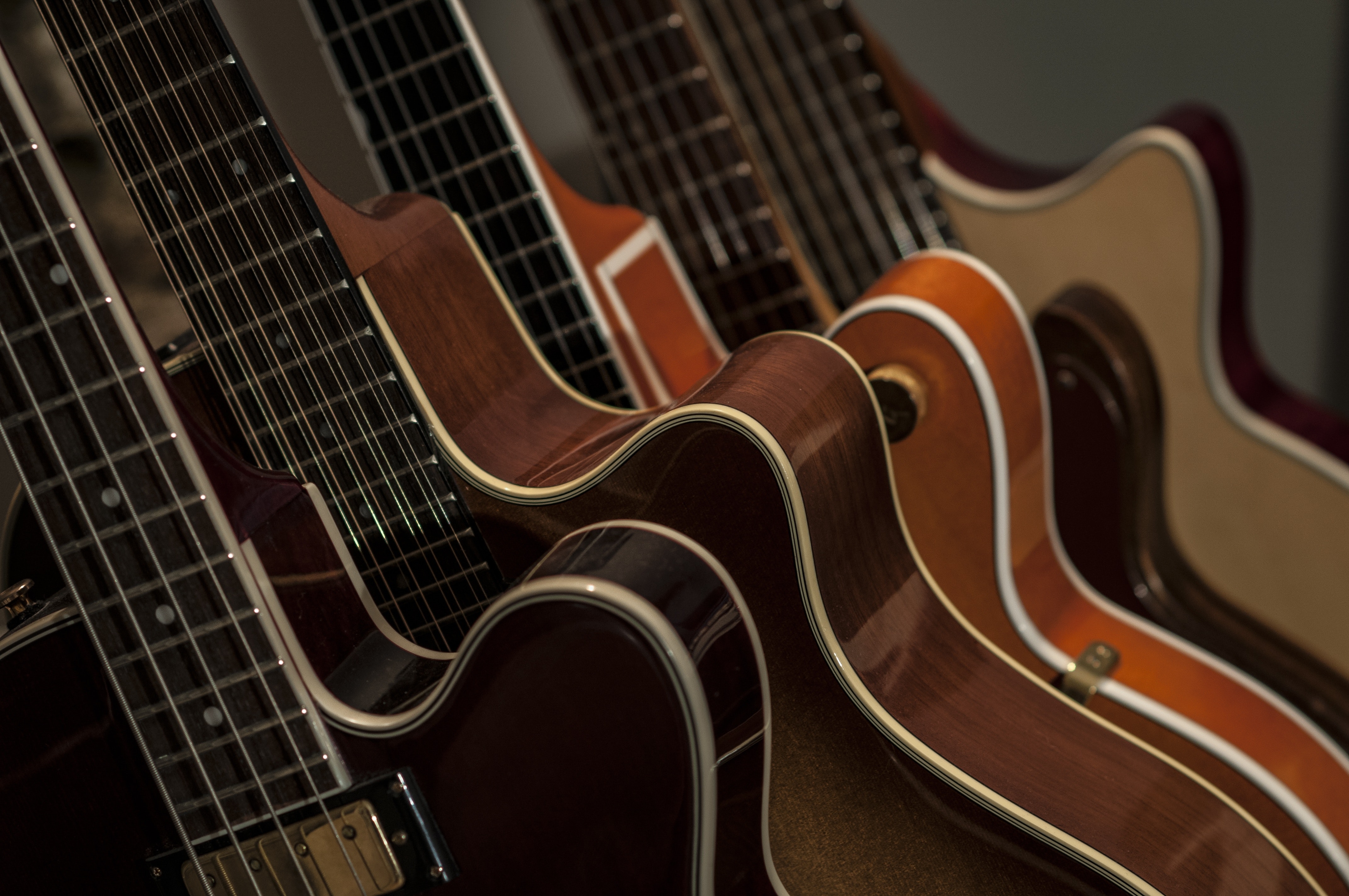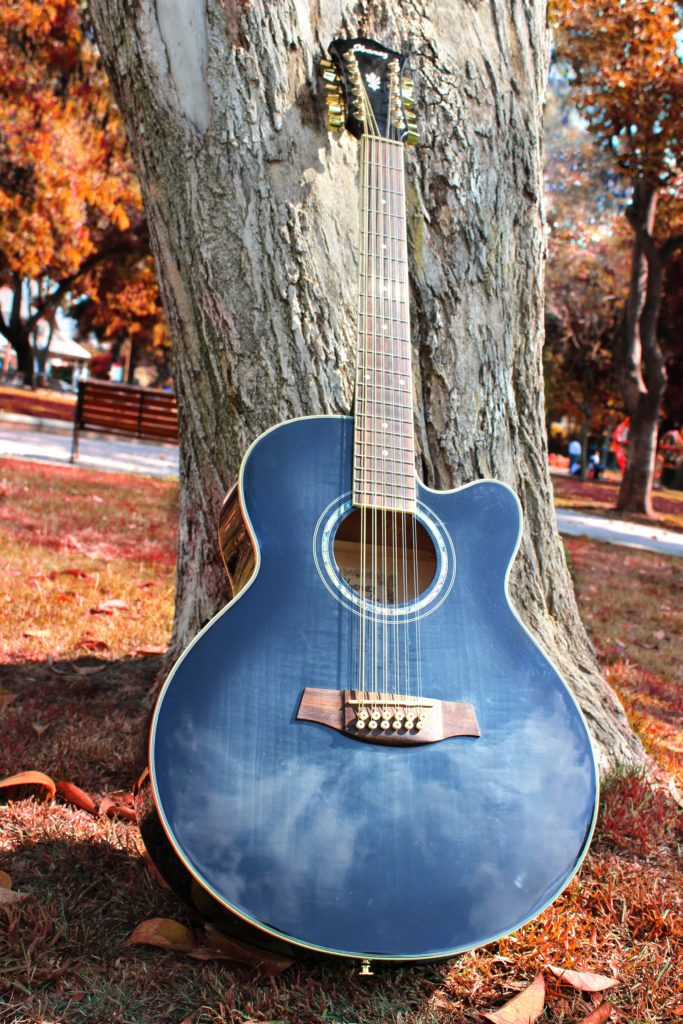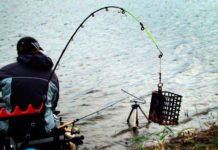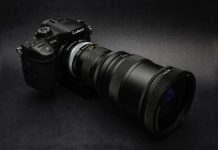Guitar is a musical instrument consisting of a figured body, a neck, with columns (tension regulators) of stretched strings located on it, by sorting which, with the help of the instrument, you can extract musical sounds and put them into melodies and songs, accompanying or performing solo.
Previously, the strings for such plucked instruments were made from animal tendons. Now the manufacturing technology is modernized and automated.
In this article, we will consider how to choose the right strings using the example of guitar strings. The editors of the site "bestx.htgetrid.com/en/" have prepared for you an overview of the best string sets for 2020.
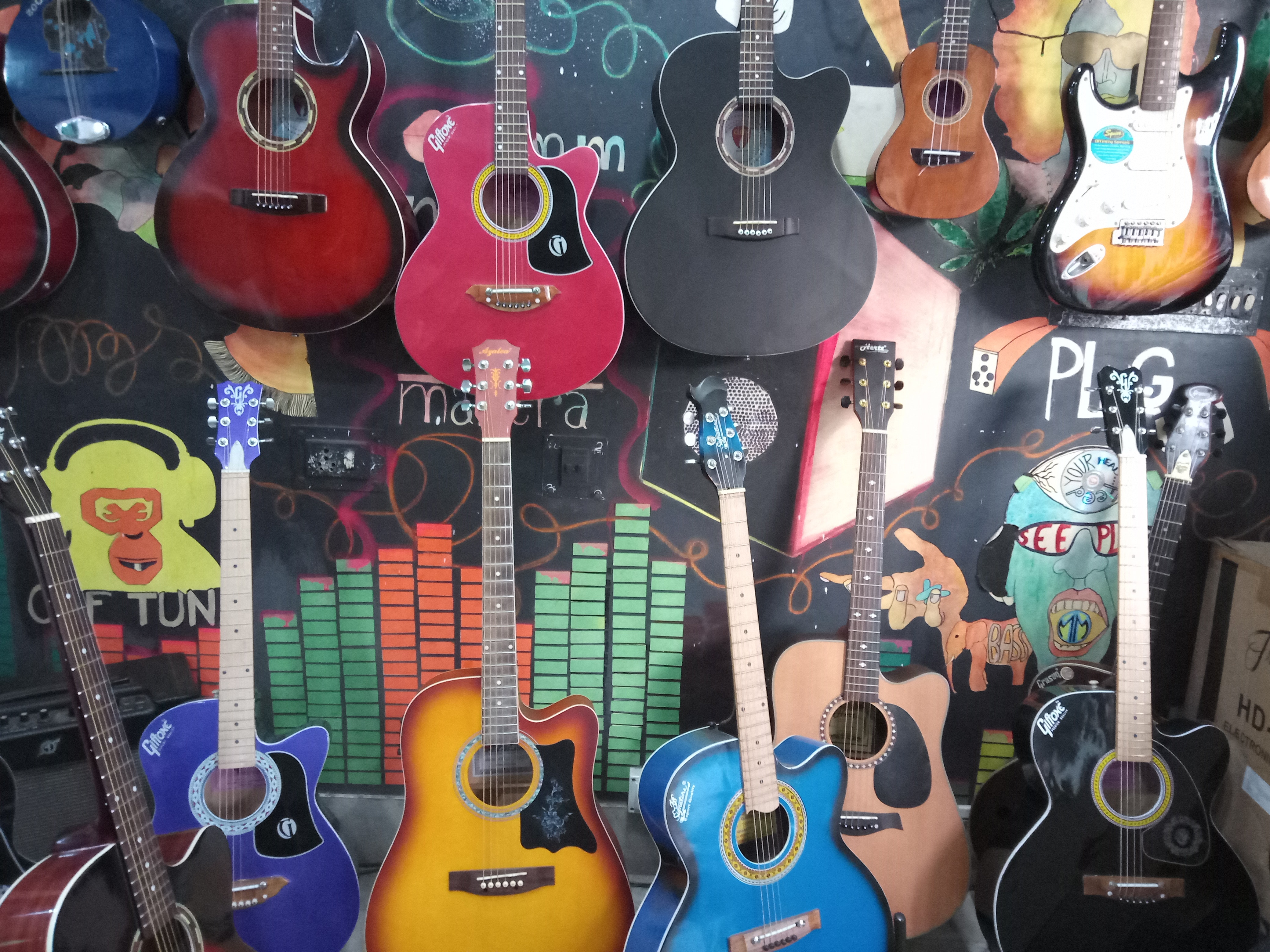
Content
General description of guitars and strings
There are a huge number of guitars that differ in the type and size of the construction, the sounds emitted, the way they are produced, the possibility of using any playing technique, etc.
It:
- classical Spanish guitar;
- folk - a type of acoustic guitar with 6 metal strings. This is 2 in 1: an improved classical guitar and a smaller copy of a western guitar.
- Western is a popular type of guitar, the most common;
- travel - tourist;
- Russian seven-string;
- Bas-guitar;
- electric guitar - with electronic filling, the possibility of different sounds and choice of performance style;
- with two necks;
- electroacoustic - including the advantages of acoustic and electrical;
- semi-acoustic - electric guitar that does not require connection, etc.
Extraction of musical sounds from an instrument is possible with the help of fingers, a pick.
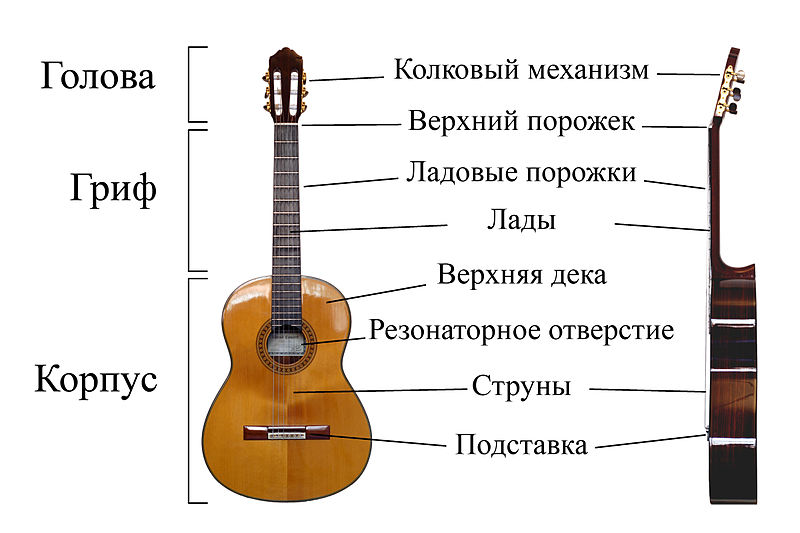
String device
A string thread is a simple structure consisting of:
- a core made of steel wire. It can be round or hexagonal (hex).
- Braid (protective layer) made from various alloys and coatings.
- A ball-shaped or ring-shaped tip, through which the metal thread is attached to the instrument.
Basic criteria for choosing strings
Braid options
Basses differ in the material they are made of.
The material used will affect their durability and brightness. It also affects durability, the nature of the sound emitted and the price.
The winding (gimp) can be made of various metals or alloys, silk, polymers, plastic, etc. There are many of them, the most common:
- copper
Inexpensive and not durable, but with clear sound, no expression of individuality. Their disadvantage is rapid wear, because the metal is soft and quickly frays and oxidizes.
Their "working capacity" lasts for 2-3 months, then the acoustic properties deteriorate.
But for beginners, copper, thin ones are perfect for the first time. Later, when the fingers become a little "stiff," it is better to replace them with thicker string options.
- Copper-tin
They are made of copper and tin alloy. They are characterized by a rich, warm tone.
- Bronze or brass
With a characteristic bright, clanking sound.With a warm timbre and good sustain (sound duration), a pleasant yellow tint.
They sound very good, but wear out quickly like copper. Therefore, they require storage in a case and regular maintenance with a dry napkin.
- Phosphor Bronze
These are models with a bright, warm sound. But they should be changed once every several months. They have a sonorous sound and low oxidation.
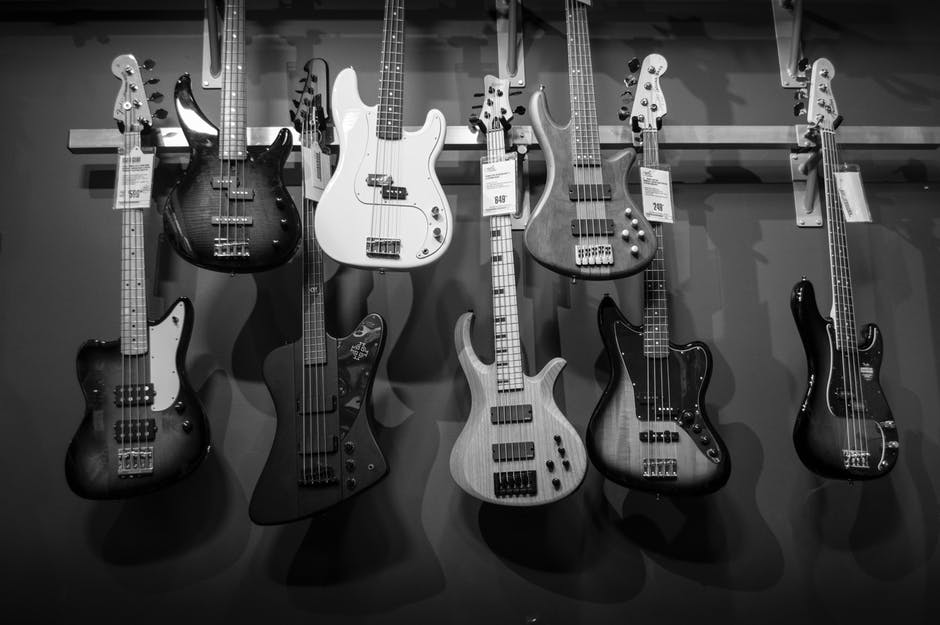
- Silver
Silver-plated versions are characterized by crisp single notes with distinctive cool notes. Which is not very suitable for chord playing.
- From polymer materials
A thin layer of plastic protects well against external mechanical damage and oxidation, without changing the sound.
The best and most popular brands are Elixir and Cleartone. These are more expensive options, but with better sound characteristics and durability.
- From silk thread
In these versions, a silk thread is inserted between the metal core and the winding, which makes the sound softer and the playing noiseless.
- Nylon and other synthetic materials
It is the use of elastic, plastic-like materials for fabrication.
Bass in this case are covered with brass, copper, bronze. Such options are budgetary, with a classic sound shape and rapid wear.
They have good elongation and, once installed, take several days to "shrink". Therefore, at first they need frequent tuning.
- High density synthetic
Made from carbon fiber line. Smaller diameter, but high density. Voiced, pronounced sound. They are expensive models.
- On a steel cable
Softer options, including different windings: the first three - metal threads with nylon tape, and 4-5-6 - with silver-plated copper.
They practically do not stretch and change their altitude quickly when turning with the peg (tension adjusters located on the neck).
Their high cost and uniqueness do not make them popular among musicians.
- Syntalic
The sound of such strings includes the brightness characteristic of metal and the softness of nylon models.
Good tuning (tuning) of the guitar. Less fret wear (transverse stripes on the fretboard for tone changes).
They can be pulled without problems. They have good timbre retention.
They do not fail for several months.
Advice for beginners in a musical career: it is better to try different types of strings without throwing away the packaging and describing the characteristics of the sound on it.
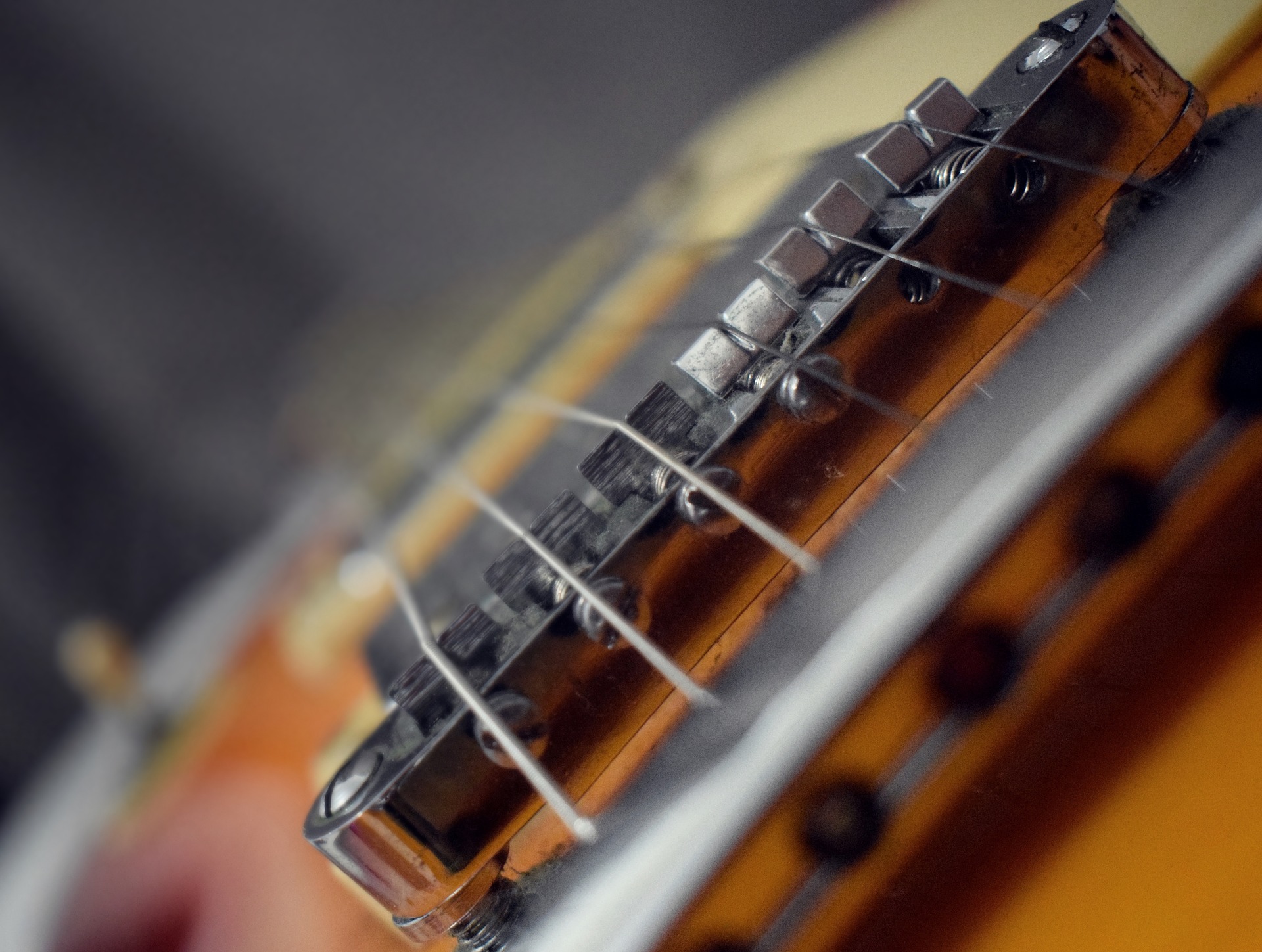
Coating method
Coating of string strands for guitars happens in different ways:
polymer coating method is the most common. It is applied in 2 ways:
- covering the braid itself before applying it. So it becomes less dirty, but it becomes sliding. Subjected to the inevitable exfoliation process.
- Coating occurs directly over the entire surface. In this case, pollution occurs faster, but they are more resistant to mechanical damage.
Winding method
With a varied number of windings, you can distinguish:
- round - with a pronounced timbre, with a large number of overtones;
- flat - with a quiet and muffled sound timbre;
- semicircular, which is the middle option between round and flat. Although the sound is bright with it, it's not easy to play with such a winding.
Tips:
- round winding is suitable for noisy companies;
- if the neighbors are nervous and react to the game, then you need to choose a flat one.
What happens if you install "wrong" and "wrong"
The types of guitars are quite varied, as are the types of strings. Each tool has a specific type.
If you install the wrong ones and on the wrong guitar, then the strength of the vibration, the timbre of the sound, will change, the game will be difficult.
For example:
If you install a nylon version on a western guitar, the sound will become soft and dull. You can play for several months. It will be convenient for a beginner musician, but then reinstallation on metal versions will be necessary.
But metal models cannot be put on a classical guitar.Only soft, nylon options are suitable for her.
Installing an inappropriate model may result in:
- to its deformation;
- pulling out the string holder;
- breakage of the neck.
On the packaging, manufacturers indicate information about the functionality of the set presented.
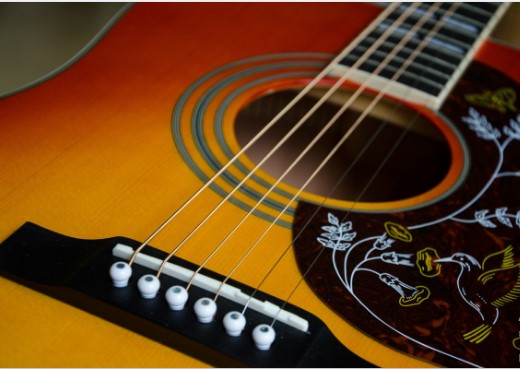
Caliber
Their thickness is measured in thousandths of an inch (0.001) from 8 to 13. These data are displayed by the manufacturer on the front side of the package.
The difference in thickness is as follows:
- 8 - the thinnest and softest, without bass and with a quiet sound;
- 9 and 10 - with a denser sound, with the presence of bass. It will be harder to pinch them with your fingers.
- 11 - for a variety of music, with different speed parts, strings with an average thickness of 0.011 inches are suitable. This is a compromise between sound quality and guitar playability.
- 12 - For professional musicians, a 0.012 inch diameter is suitable. The sound with them will be powerful and colorful, but it should be borne in mind that it is technically difficult to reproduce complex works on them.
- 13 - the hardest, but with correct, bright, good and loud sound.
The choice of thickness will depend on the level of the musician's playing and the nature of the pieces of music he is performing.
Diameter affects playability, sound, timbre and richness of the sound.
The thicker, the richer the sound will be in overtones (pressing the sounding string with your finger in the fret area), but it will require more effort when pressed.
The sound will be brighter and more colorful, but more difficult to play. harder to push them to the bar.
Thin ones will be easier to clamp, but the volume of the sound will suffer because of this.
Therefore, the choice of size 11 becomes the best option.
The advantages of such models:
- convenience when playing;
- their light tension;
- providing low voltage to the guitar.
Disadvantages:
- less sound volume;
- fast gusts;
- characteristic rattling.
Pros of thick options:
- great surround sound;
- sustain.
Disadvantages:
- the difficulty of the game;
- strong tension,
- exerting tension on the guitar.
What you should pay attention to when choosing:
- the thicker the string, the more bass it will produce;
- subtle options accentuate high tones.
Stringing Guidelines for Beginners:
- You can start with # 8. They are softer and are good for quick guitar learning and chords.
- After a couple of weeks of the transition period, the feeling of pain in the fingers from the game disappears.
- Later, number 10, 11 are suitable for playing songs. It is easier to work with them a lot and diligently because of the ease of pressing them. Fingers won't get tired either. The acoustics of sound will be somewhat "lame", but for a beginner this moment is not the most important.
- Over time, the caliber can be increased.
By gradually comparing sound and hardness, you can choose the best sound option for yourself.
Recommendations for the selection of thickness depending on:
- the size of the guitar - the smaller the instrument, the thinner the strings should be on it and vice versa;
- the age of the guitar - the older the instrument, the smaller the caliber is required to avoid deformation;
- playing style - (fingers, punch, pick) for beginners to play with fingers, subtle types are needed. Medium when using a fight and a pick. In a combined game - a set with different thickness.
Tension
Each string has a specific tension. It affects the sound. It depends on it how much effort you need to make when playing to extract sound.
It can be normal, medium, strong and is indicated as:
- medium tension;
- normal tension;
- normal;
- medium, etc.
This parameter is indicated by the manufacturer in the packaging instructions.
The choice of pulling force is related to the way the instrument is played.
The tension depends on personal preference, which can be found empirically.
Pay attention to this information during installation.
How to care
To increase the service life and sound quality, you must:
- wash your hands before ... playing;
- wipe them with a special solution sold in music stores as a companion product and cleans them of sweat and dirt.
What to look for, tips
If the string is damaged, it vibrates unevenly, resulting in a dull sound and a decrease in sustain.
Varieties of sets
6-string, 7-string, 12-string sets, in which the 1st is thinnest and the last is thicker than the rest.
Varieties of sets with caliber ratio:
- Ultra Light (0.008 - 0.039);
- Super Light (0.009 - 0.042);
- Light (0.010 - 0.046);
- Medium (0.011 - 0.49);
- Medium Heavy (0.012 - 0.052);
- Heavy (0.13 - 0.56).
How to change strings and tune your guitar
Using the step-by-step guide, you can learn how to change strings yourself and how to tension them correctly.
To do this, you need to prepare:
- a turntable for tuners (you can do without it, with the help of your hands);
- the hex wrench included with the guitar for fixing the truss and eliminating the ringing of the strings;
- pliers for trimming excess.
Then there is a sequential:
- loosening old strings and removing them;
- removing the pegs located at the bottom of the guitar body (not with pliers, they can break), but with the help of a special device;
- removing strings from the bottom holes.
Taking advantage of the moment, it will not be superfluous to take care of the case:
- remove dirt from the surface of the tool;
- clean the outer part of the case and the inner part of the dust, as well as the neck.
Then carry out:
- regulation of the bar by rotating the truss rod;
- straightening a new model, initially folded into a ring;
- unfolding on the body according to the numbers: the edge with rings at the bottom, free edges towards the neck, to the corresponding pegs; the tip with a ball (ring) is lowered into the hole until it stops;
- securing the pegs.
Now you can go to the top of the case.
You need to start with the 6th string:
- wrap the free edge around the corresponding peg axis. Leave its edge under the winding;
- pull slightly to secure;
- for 6, 5, 4 column numbers, rotate for tension, clockwise. The rest are counterclockwise.
- Cut off excess parts in the splitter so that they do not interfere.
After installation, final configuration of the tool is required:
- it happens with the help of a tuner (a special device for determining the note of each string) or an application in Android or iOS, which should be downloaded.
- The tuning process will take some time: about a day or two for their "shrinkage". After which, you may have to repeat this process again.
What you should pay attention to:
- replacement of strings occurs at once with the whole set, and not individually;
- initially, the installation assumes that it is not up to the main setting;
- tuner rotator simplifies tuning process.
How much is:
- From 46 rubles. per set # 4, Alice A105BK-H D-4h, for classical guitar, Hard tension, made of nylon;
- up to 3990 rubles. per set for 5-string bass, Thomastik Infeld IN345, in Superalloy.
The best manufacturers of quality models
- D Addario (USA)
A brand known since the 17th century. He moved to the USA in the 20th century, firmly occupying a leading position in the production of strings for instruments.
Widely known and popular with hobbyist options. But the quality is controversial, tk. are subject to rapid wear.
- Dunlop (USA)
A well-known company, although it has restrained consumer reviews about the average quality of its products. But it compares favorably with Chinese products.
- Ernie ball (USA)
A fairly popular American brand, recognized by most musicians as the manufacturer with the best sound / price / quality / durability ratio.
- DR (USA)
The brand has been producing tool accessories since 1989. The most popular types are for electric guitars. And they even have fakes from Chinese manufacturers.
The advantages include high durability, quality, exceptional timbre.
- Elixir (USA)
The strings from this brand have a polymer protective coating of 2 types:
- Polyweb for flawless smoothness;
- Nanoweb that enhances the brightness of the sound.
Such protection extends their service life by about 3 times compared to similar types.
- GHS (USA)
A US brand that has established itself as a manufacturer of quality products recognized by many of the world's most famous musicians-guitarists.
As a result, it has a large number of fakes. The most famous string set from this manufacturer is Boomers.
- Martin (Italy)
An Italian brand that manufactures kits for acoustic and, more rarely, electric guitars. In general, the products are of good quality, with positive user reviews.
- Fender (USA)
An American brand that has been producing guitars and strings since 1946. One of the largest manufacturers in the global market.
- Thomastik (Austria)
The products of this brand are intended for professional guitarists.
These kits are perfect for those who like to experiment with sound. For example, this manufacturer has models with cables, which up to this point were characteristic only for violins.
- Savarez (France)
The string products of the French brand are characterized by a high level of performance and decent quality. The line includes kits for almost all types of guitars.
- Cleartone (Canada)
The strings of this brand are characterized by durability and good protection. Not only the braid, but also each metal thread is covered with a thin anti-corrosion protection. These are high quality products, similar to Elixir.
- Dean Markley
An American brand that allows itself to experiment with string sets. For example, their nitrogen hardening. But, in general, these are benign and inexpensive models with an extraordinary manufacturer's approach to the process of their production.
- La bella
If you want to get acquainted with the products of this brand, then you should get ready for average quality, but budget cost. A perfectly suitable option for newcomers to the music industry.
When choosing a brand-manufacturer, one should proceed from the budgetary possibilities and aesthetic preferences.
But remember that:
- A stick with threads (bad instrument) will sound bad with expensive strings;
- on a good, quality instrument, even with average quality strings, there will be a decent melody sound.
What you should pay attention to in order to avoid mistakes when choosing:
to avoid the purchase of counterfeit products, string sets should be purchased only in trusted professional stores, at the same time paying attention to the quality and design of the packaging.
Ranking of the best string sets based on customer popularity
For classical guitar
FLIGHT / CS28H
- Manufacturer: Flight;
- Material: nylon;
- Average cost: 190 rubles;
- Reviews: Average rating 4.8 out of 5;
Photo:
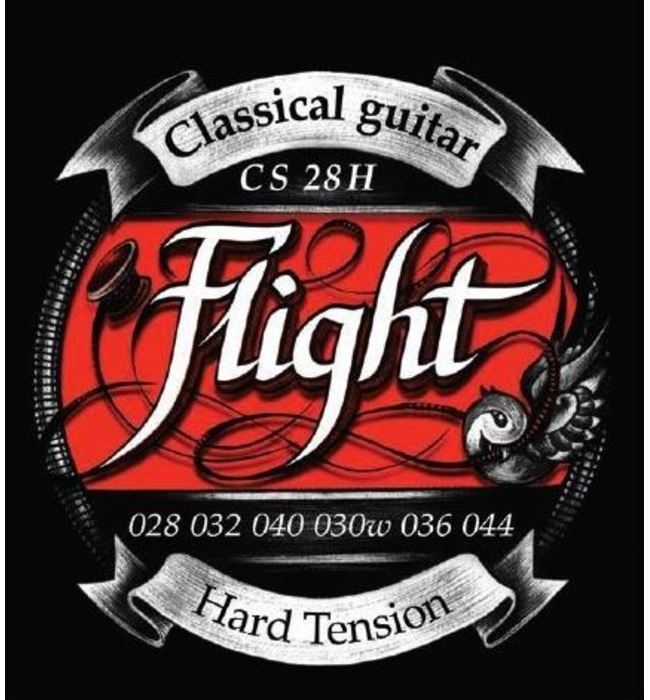
The set is suitable for installation on a classical guitar.
The kit consists of:
- 3 strings made of pure nylon for high tone;
- the other 3 for bass sounds.
All strings are plated with silver plated copper. Withstand tension normal. Suitable for use on ½ and ¾ classic style guitars.
The sound with them is characterized by:
- duration;
- warmth;
- relief.
Advantages:
- suitable for students;
- for beginner musicians;
- for the pros;
- inexpensive;
- reliable;
- meet high standards.
Disadvantages:
- not found.
A107-C
- Manufacturer: ALICE;
- Material: multicolored nylon;
- Average cost: 290 rubles;
- Reviews: average rating 4.7 out of 5;
Photo:
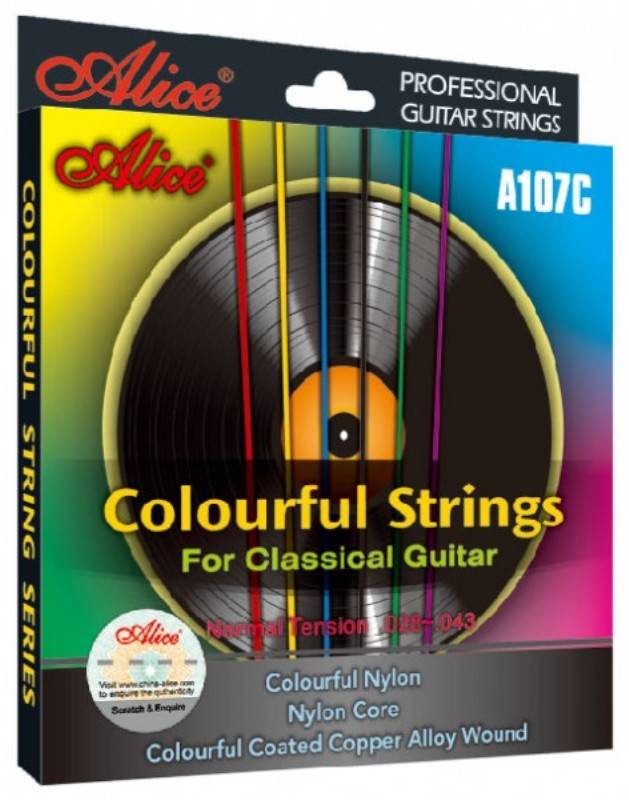
A set for installation on a classical guitar from the Alise brand. The gimp (winding) of the base strings is made of multi-colored copper. The strings themselves are made of multi-colored nylon. They range in thickness from 0.028 "to 0.43". This is a great option for those just starting out in a music career.
A total of 6 pieces in a set, with Medium tension.
Advantages:
- quality;
- affordable cost;
- key.
Disadvantages:
- for beginners only.
A107-N
- Manufacturer: ALICE;
- Material: nylon;
- Average cost: 210 rubles;
- Reviews: average rating 4.6 out of 5;
Photo:
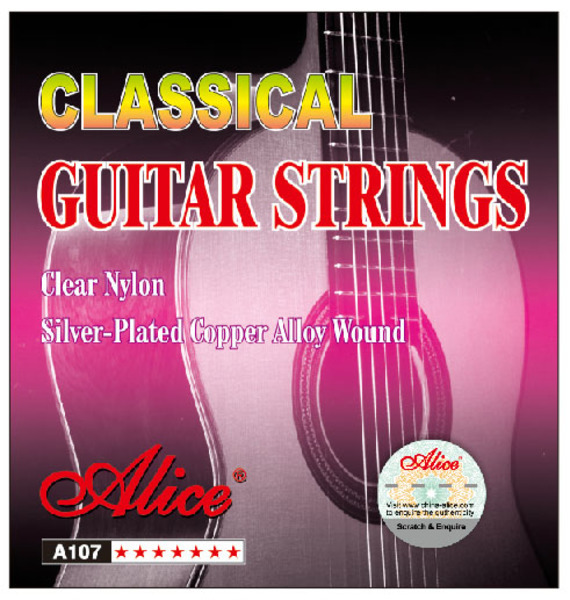
The strings are from the same manufacturer, made of pure nylon.
They are also popular with aspiring musicians and students.
Plastic packing size 11 cm * 11 cm * 1 cm.
Now it is a hit of sales of strings for classical guitar.
Includes 6 pcs. Made of pure nylon with silver-plated copper braid, normal tension.
Advantages:
- decent quality;
- for beginners.
Disadvantages:
- not for professional use.
For acoustic guitar
RFS-1047
- Manufacturer: ROCKDALE;
- Material: phosphor bronze;
- Average cost: 160 rubles;
- Reviews: average rating 4.5 out of 5;
Photo:
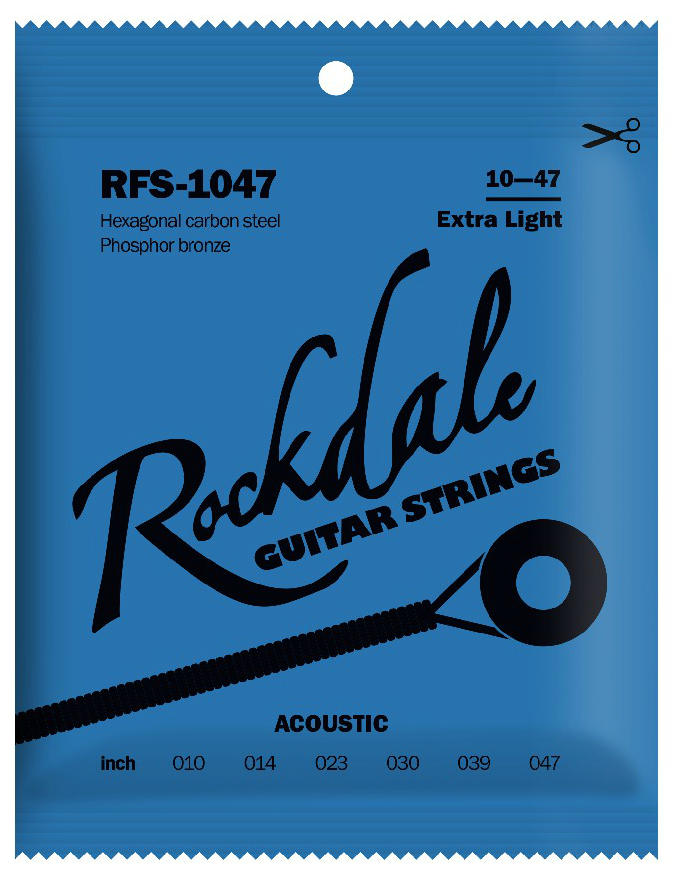
The set is suitable for use by fans of acoustic guitar, for whom playing is a hobby. It is also an ideal choice for students and beginners acquaintance with a musical instrument.
Strings # 1 and # 2 are made of steel. The bass units have a 6-sided core. Phosphor bronze winding.
No. 10-47 is the best option for playing different styles.
Advantages:
- compliance with quality standards;
- pre-sale control;
- cost compliance;
- excellent tension;
- keeping the order;
- voiced.
Disadvantages:
- require "precipitation" after pulling from 1 to 2 days.
LA 9
- Manufacturer: Gospodin-musykant;
- Material: steel;
- Average cost: 210 rubles;
- Reviews: average rating 4.6 out of 5;
Photo:
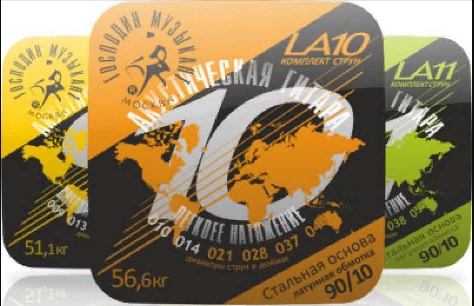
A budget option from a Russian brand for a low cost, consisting of 6 strings for an acoustic musical instrument. Made of steel with soft brass winding. Thus, the bass will be protected from wear and tear.
Strings # 1 and # 2 are made of high carbon steel with brass.
From No. 3 to No. 6 - profiled, with brass winding.
Round type profile.
Advantages:
- quality;
- the brightness of the sound;
- balance of bass and treble;
- do not slip out;
- stabilization takes a day.
Disadvantages:
- some difficulties in setting up.
2150
- Manufacturer: Ernie Ball (USA);
- Material: phosphor bronze;
- Average price: 645 rubles;
- Reviews: average rating 4.5 out of 5;
Photo:
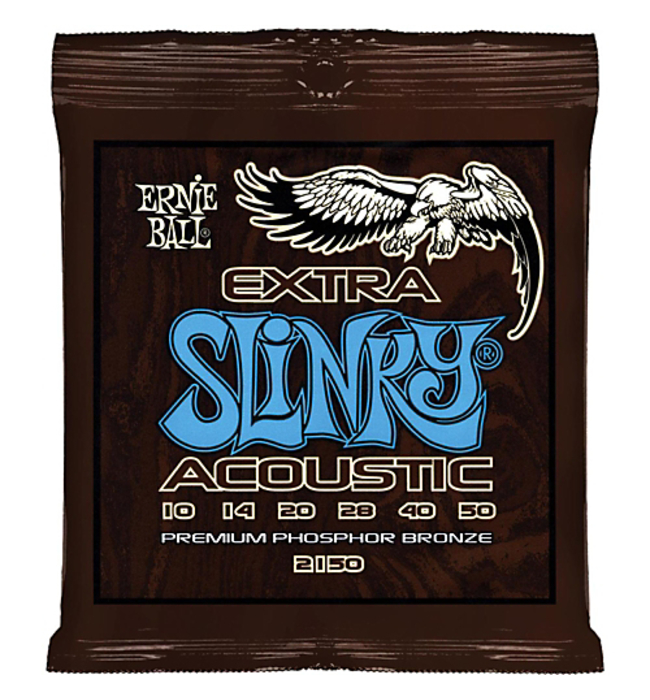
Set of 6 strings for acoustic guitar.
The braid is made of phosphor bronze (an alloy of tin, copper, phosphorus), which has a positive effect on the sound and performance of the product. Hexagonal core.
With a diameter of 10 to 52 inches (10, 15, 22, 30, 42, 52).
This model was developed by the manufacturer taking into account the wishes of musicians around the world.
Advantages:
- suitable for acoustic and electronic guitars;
- deep bass;
- clean tops.
Disadvantages:
- not found.
For electric guitar
RES-1052
- Manufacturer: ROCKDALE;
- Material: nickel plated steel;
- Average cost: 160 rubles;
- Reviews: average rating 4, 0 out of 5;
Photo:
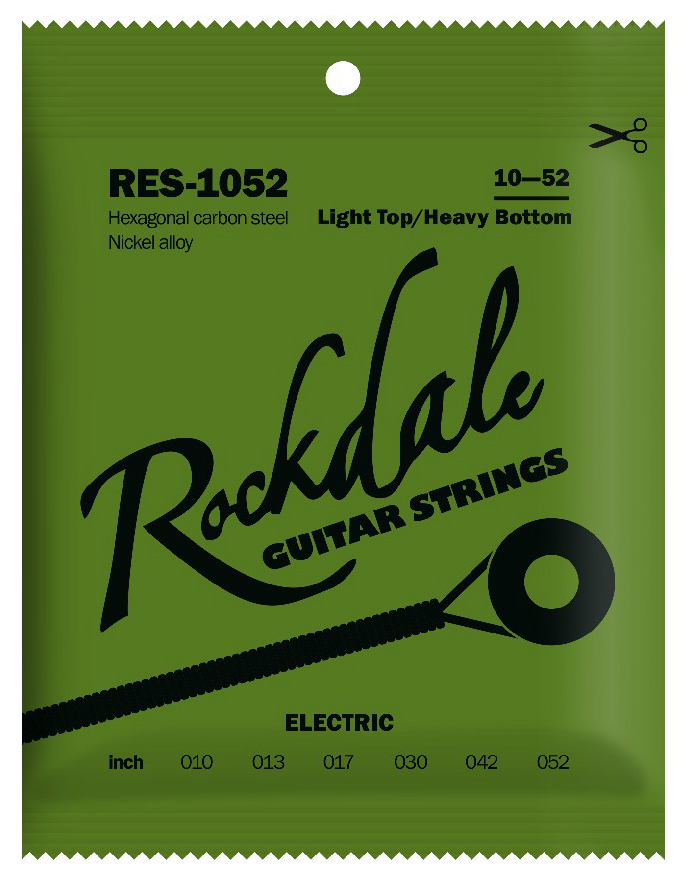
American brand, positioned in the manufacture of budgetary musical instruments and accessories for them for amateur musicians, students, students of music schools, etc. In particular, strings for electric guitars.
The brand is well known in the world market of manufacturers as using modern technologies and adhering to a moderate price policy for its products.
The set includes from No. 10 to No. 52, designed for playing the electric guitar. They have a hexagonal core.
The edges are marked with colored markings corresponding to the numbers for easy distribution during installation.
Nickel plating.
Advantages:
- quality from a global brand;
- a suitable option for music training.
Disadvantages:
- only 1 month warranty.
12057 NanoWeb
- Manufacturer: Elixir;
- Average cost: 1600 rubles;
- Reviews: average rating 4.9 out of 5;
Photo:
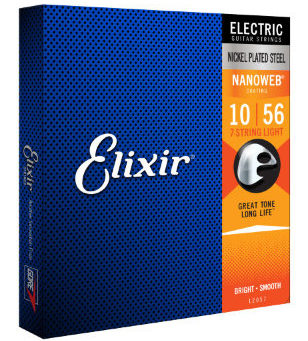
For this set of strings, the manufacturer gives the user a 1 year warranty. There are 7 of them in the set. with No. 10; 13; 56; 17; 26; 36; 46 in. With ultra-thin nanoweb coating, give the feel of traditional strings. Tension Light.
Advantages:
- with a long warranty from the manufacturer;
- bright sound;
- energy of sound.
Disadvantages:
- not found.
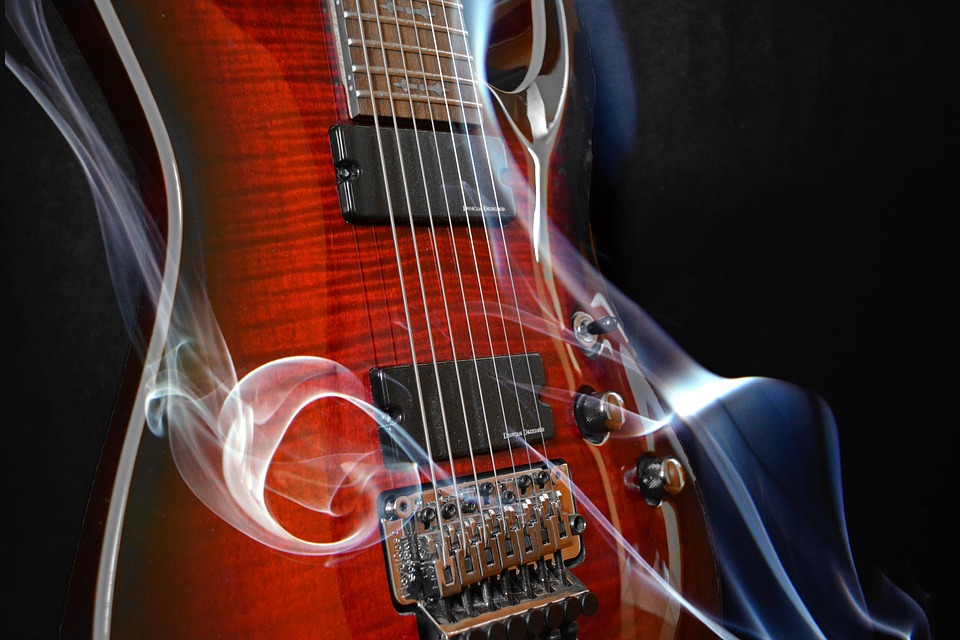
Conclusion
Having mastered the criteria for choosing strings for the guitar, you can similarly pick them up for its “relatives”: for banjo, for domra, for bazooka, for mandolin, for ukulele, etc.
The choice of strings is an individual matter. And there is no need to be afraid to experiment in order to find “yours” for an individual sound that is characteristic only of your performance. If you have experience using the types of strings described in the rating, or a more interesting model, share your opinion in the comments.

